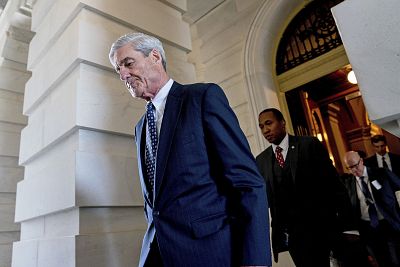Analysis: The indictment does not allege Russian collusion, but Mueller might be building a conspiracy case.
When special counsel Robert Mueller charged a dozen Russian intelligence officers in July with hacking the Democrats, the indictment described online conversations between a Russian operative and "a person who was in regular contact with senior members of the presidential campaign of Donald J. Trump."
That person, it quickly emerged, was Roger Stone.
But the long-awaited criminal indictment that finally dropped against Stone on Friday did not charge the political dirty trickster with conspiring with the Russians. Instead, it accused him of lying to Congress about his interactions with WikiLeaks, the group that Mueller says accepted hacked Democratic emails from the Russians and released them during the campaign in a way designed to inflict pain on Hillary Clinton.
The indictment offered tantalizing hints about the role of senior Trump campaign officials but did not present evidence that the Trump campaign coordinated with the Russian election interference operation, which is the major question Mueller was hired to answer.
That glaring omission raised a fundamental question: Is this all Mueller has? Or is the Stone indictment merely a prelude to a much more sweeping legal case that ensnares others in the Trump orbit, and perhaps the president himself?
Or, is there a middle course, in which Mueller lays out details of so-called "collusion" between the Trump campaign and Russia in a report that ultimately becomes public?
Many legal experts suspect that Mueller, who speaks only in court documents, has much more to say.
"Prosecutors never put all of their evidence into an indictment," said Joyce Vance, a former U.S. Attorney in Alabama and an NBC News contributor. "Just because this indictment doesn't slap you in the face with a conspiracy doesn't mean Mueller doesn't have that evidence."
Vance added, "Could this be the endpoint? Maybe, but this doesn't look like a capstone indictment. It leaves too many un-pulled threads."
Glenn Kirschner, another former federal prosecutor and NBC News contributor, went further:
"This is a conspiracy indictment," he said. "He just left out the conspiracy charges."
In an effort to induce Stone to cooperate, Kirschner believes, Mueller filed a basic set of charges that allowed him to arrest Stone in a pre-dawn raid with heavily armed FBI agents.
If Stone fails to flip, Kirschner and other experts theorize, Mueller will file a superseding indictment in a few weeks detailing much more serious charges. Mueller followed that pattern in the case of former Trump campaign chairman Paul Manafort, observers point out.
Even former Trump campaign aide Sam Nunberg, who testified before Mueller's grand jury, said on MSNBC Friday that he thinks the special counsel is pursuing a conspiracy case against people in Trump's inner circle.
"We haven't gotten into the transition yet," he said, noting that he was grilled by Mueller's team about events after Trump won the election.
"I think that in light of the connections or contacts with the Russian government, that there is going to be a case made…about some kind of conspiracy."
Stone denies any wrongdoing, and Trump's legal team, not surprisingly, is focused on what the indictment didn't say.
"The indictment today does not allege Russian collusion by Roger Stone or anyone else," said Jay Sekulow, the president's attorney. "Rather, the indictment focuses on alleged false statements Mr. Stone made to Congress."
That is true. But the indictment also suggests that Stone knew, before WikiLeaks released its first tranche of Democratic emails on July 22, 2016, that the organization had damaging information on Clinton.
"By in or around June and July 2016, Stone informed senior Trump campaign officials that he had information indicating (WikiLeaks) had documents whose release would be damaging to the Clinton campaign," the indictment says.
Even more significantly, a few days after the first WikiLeaks dump, the indictment says, a person high up in the Trump campaign was ordered to tell Stone to see what he could find out about future email releases. He was successful, the indictment says.
"After the July 22, 2016 release of stolen DNC emails by (WikiLeaks), a senior Trump campaign official was directed to contact Stone about any additional releases and what other damaging information (WikiLeaks) had regarding the Clinton campaign," the indictment says. "Stone thereafter told the Trump Campaign about potential future releases of damaging material by (WikiLeaks).
It was June 14, 2016 that the world learned, through the Washington Post, that Russian government hackers had penetrated DNC computers.
By mid-July, the notion that the Russians were the source of the email disclosures was so pervasive that even Trump was talking about it.
"Russia, if you're listening, I hope you're able to find the 30,000 emails that are missing," Trump famously said on July 13, referring to emails Clinton had deleted from the private server she had used as secretary of state.
Stringing those facts together, a picture is painted: The Trump team knew WikiLeaks got Democratic emails from the Russian government, and yet they pursued them anyway. Just as Donald Trump Jr. made clear he was willing to do when he sat down in Trump Tower with a Kremlin-connected Russian lawyer in June 2016 on the promise of incriminating information on Clinton.
Does it add up to collusion? Criminal conspiracy?
The American public can only wait to see what Robert Mueller has left to say.












